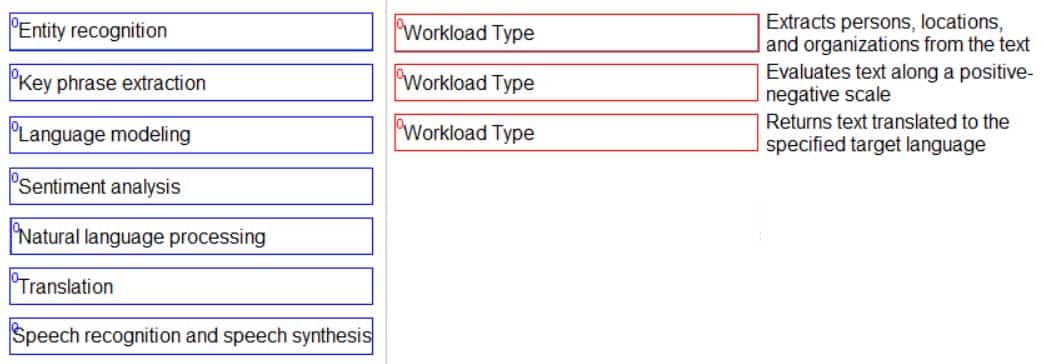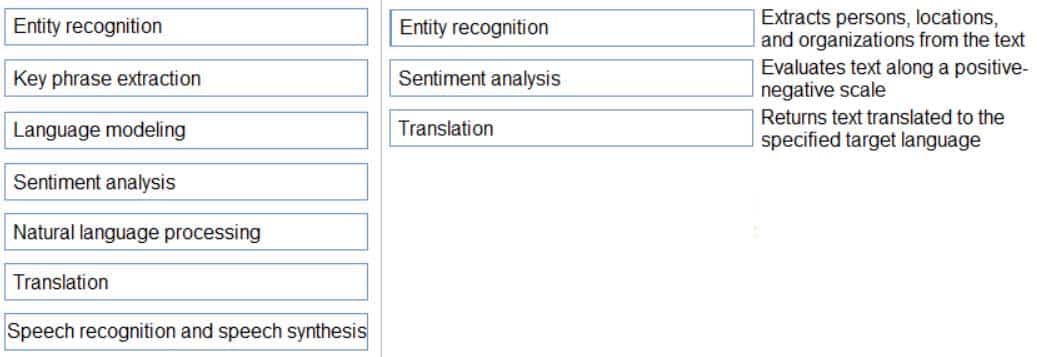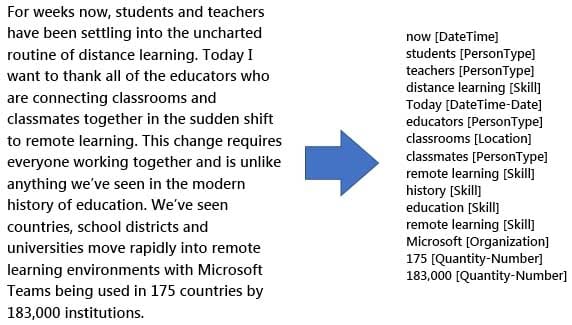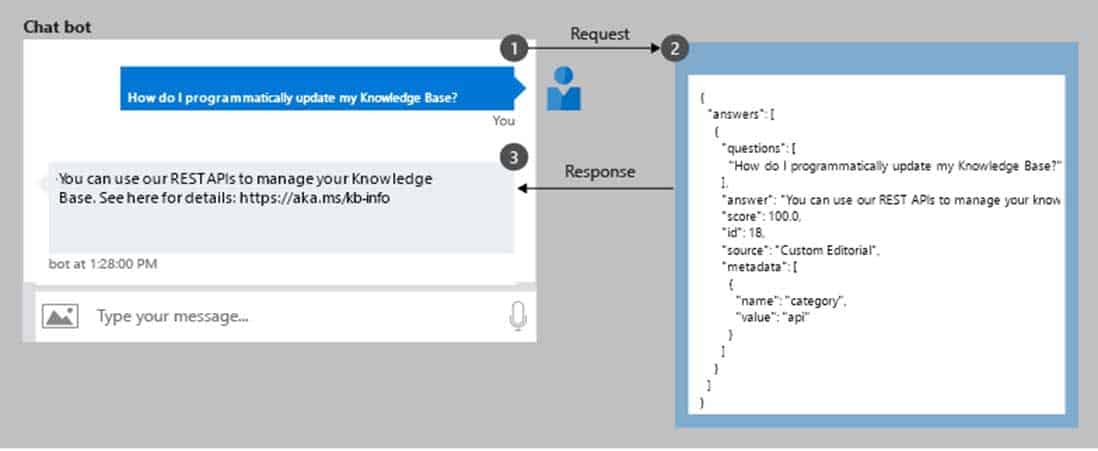AI-900 : Microsoft Azure AI Fundamentals : Part 04
AI-900 : Microsoft Azure AI Fundamentals : Part 04
-
You need to make the press releases of your company available in a range of languages.
Which service should you use?
- Translator Text
- Text Analytics
- Speech
- Language Understanding (LUIS)
Explanation:
Translator is a cloud-based machine translation service you can use to translate text in near real-time through a simple REST API call. The service uses modern neural machine translation technology and offers statistical machine translation technology. Custom Translator is an extension of Translator, which allows you to build neural translation systems. -
HOTSPOT
For each of the following statements, select Yes if the statement is true. Otherwise, select No.
NOTE: Each correct selection is worth one point.

AI-900 Part 04 Q02 035 Question 
AI-900 Part 04 Q02 035 Answer Explanation:
The Text Analytics API is a cloud-based service that provides advanced natural language processing over raw text, and includes four main functions: sentiment analysis, key phrase extraction, named entity recognition, and language detection.
Box 1: Yes
You can detect which language the input text is written in and report a single language code for every document submitted on the request in a wide range of languages, variants, dialects, and some regional/cultural languages. The language code is paired with a score indicating the strength of the score.Box 2: No
Box 3: Yes
Named Entity Recognition: Identify and categorize entities in your text as people, places, organizations, date/time, quantities, percentages, currencies, and more. Well-known entities are also recognized and linked to more information on the web. -
DRAG DROP
Match the types of natural languages processing workloads to the appropriate scenarios.
To answer, drag the appropriate workload type from the column on the left to its scenario on the right. Each workload type may be used once, more than once, or not at all.
NOTE: Each correct selection is worth one point.

AI-900 Part 04 Q03 036 Question 
AI-900 Part 04 Q03 036 Answer Explanation:
Box 1: Entity recognition
Named Entity Recognition (NER) is the ability to identify different entities in text and categorize them into pre-defined classes or types such as: person, location, event, product, and organization.Box 2: Sentiment analysis
Sentiment Analysis is the process of determining whether a piece of writing is positive, negative or neutral.Box 3: Translation
Using Microsoft’s Translator text APIThis versatile API from Microsoft can be used for the following:
Translate text from one language to another.
Transliterate text from one script to another.
Detecting language of the input text.
Find alternate translations to specific text.
Determine the sentence length. -
HOTSPOT
For each of the following statements, select Yes if the statement is true. Otherwise, select No.
NOTE: Each correct selection is worth one point.

AI-900 Part 04 Q04 037 Question 
AI-900 Part 04 Q04 037 Answer Explanation:
Box 1: Yes
Content Moderator is part of Microsoft Cognitive Services allowing businesses to use machine assisted moderation of text, images, and videos that augment human review.The text moderation capability now includes a new machine-learning based text classification feature which uses a trained model to identify possible abusive, derogatory or discriminatory language such as slang, abbreviated words, offensive, and intentionally misspelled words for review.
Box 2: No
Azure’s Computer Vision service gives you access to advanced algorithms that process images and return information based on the visual features you’re interested in. For example, Computer Vision can determine whether an image contains adult content, find specific brands or objects, or find human faces.Box 3: Yes
Natural language processing (NLP) is used for tasks such as sentiment analysis, topic detection, language detection, key phrase extraction, and document categorization.Sentiment Analysis is the process of determining whether a piece of writing is positive, negative or neutral.
-
You are developing a natural language processing solution in Azure. The solution will analyze customer reviews and determine how positive or negative each review is.
This is an example of which type of natural language processing workload?
- language detection
- sentiment analysis
- key phrase extraction
- entity recognition
Explanation:
Sentiment Analysis is the process of determining whether a piece of writing is positive, negative or neutral. -
You use natural language processing to process text from a Microsoft news story.
You receive the output shown in the following exhibit.

AI-900 Part 04 Q06 038 Which type of natural languages processing was performed?
- entity recognition
- key phrase extraction
- sentiment analysis
- translation
Explanation:
Named Entity Recognition (NER) is the ability to identify different entities in text and categorize them into pre-defined classes or types such as: person, location, event, product, and organization.In this question, the square brackets indicate the entities such as DateTime, PersonType, Skill.
-
DRAG DROP
You plan to apply Text Analytics API features to a technical support ticketing system.
Match the Text Analytics API features to the appropriate natural language processing scenarios.
To answer, drag the appropriate feature from the column on the left to its scenario on the right. Each feature may be used once, more than once, or not at all.
NOTE: Each correct selection is worth one point.

AI-900 Part 04 Q07 039 Question Explanation:
Box1: Sentiment analysis
Sentiment Analysis is the process of determining whether a piece of writing is positive, negative or neutral.
Box 2: Broad entity extraction
Broad entity extraction: Identify important concepts in text, including key
Key phrase extraction/ Broad entity extraction: Identify important concepts in text, including key phrases and named entities such as people, places, and organizations.
Box 3: Entity Recognition
Named Entity Recognition: Identify and categorize entities in your text as people, places, organizations, date/time, quantities, percentages, currencies, and more. Well-known entities are also recognized and linked to more information on the web. -
You are developing a solution that uses the Text Analytics service.
You need to identify the main talking points in a collection of documents.
Which type of natural language processing should you use?
- entity recognition
- key phrase extraction
- sentiment analysis
- language detection
Explanation:
Broad entity extraction: Identify important concepts in text, including key
Key phrase extraction/ Broad entity extraction: Identify important concepts in text, including key phrases and named entities such as people, places, and organizations. -
In which two scenarios can you use speech recognition? Each correct answer presents a complete solution.
NOTE: Each correct selection is worth one point.
- an in-car system that reads text messages aloud
- providing closed captions for recorded or live videos
- creating an automated public address system for a train station
- creating a transcript of a telephone call or meeting
-
HOTSPOT
To complete the sentence, select the appropriate option in the answer area.

AI-900 Part 04 Q10 040 Question 
AI-900 Part 04 Q10 040 Answer -
You need to build an app that will read recipe instructions aloud to support users who have reduced vision.
Which version service should you use?
- Text Analytics
- Translator Text
- Speech
- Language Understanding (LUIS)
-
HOTSPOT
For each of the following statements, select Yes if the statement is true. Otherwise, select No.
NOTE: Each correct selection is worth one point.

AI-900 Part 04 Q12 041 Question 
AI-900 Part 04 Q12 041 Answer -
Your website has a chatbot to assist customers.
You need to detect when a customer is upset based on what the customer types in the chatbot.
Which type of AI workload should you use?
- anomaly detection
- semantic segmentation
- regression
- natural language processing
Explanation:
Natural language processing (NLP) is used for tasks such as sentiment analysis, topic detection, language detection, key phrase extraction, and document categorization.Sentiment Analysis is the process of determining whether a piece of writing is positive, negative or neutral.
-
You plan to develop a bot that will enable users to query a knowledge base by using natural language processing.
Which two services should you include in the solution? Each correct answer presents part of the solution.
NOTE: Each correct selection is worth one point.
- QnA Maker
- Azure Bot Service
- Form Recognizer
- Anomaly Detector
-
You need to provide content for a business chatbot that will help answer simple user queries.
What are three ways to create question and answer text by using QnA Maker? Each correct answer presents a complete solution.
NOTE: Each correct selection is worth one point.
- Generate the questions and answers from an existing webpage.
- Use automated machine learning to train a model based on a file that contains the questions.
- Manually enter the questions and answers.
- Connect the bot to the Cortana channel and ask questions by using Cortana.
- Import chit-chat content from a predefined data source.
Explanation:
Automatic extraction
Extract question-answer pairs from semi-structured content, including FAQ pages, support websites, excel files, SharePoint documents, product manuals and policies. -
You have a frequently asked questions (FAQ) PDF file.
You need to create a conversational support system based on the FAQ.
Which service should you use?
- QnA Maker
- Text Analytics
- Computer Vision
- Language Understanding (LUIS)
Explanation:
QnA Maker is a cloud-based API service that lets you create a conversational question-and-answer layer over your existing data. Use it to build a knowledge base by extracting questions and answers from your semi-structured content, including FAQs, manuals, and documents. -
You need to reduce the load on telephone operators by implementing a chatbot to answer simple questions with predefined answers.
Which two AI service should you use to achieve the goal? Each correct answer presents part of the solution.
NOTE: Each correct selection is worth one point.
- Text Analytics
- QnA Maker
- Azure Bot Service
- Translator Text
Explanation:
Bots are a popular way to provide support through multiple communication channels. You can use the QnA Maker service and Azure Bot Service to create a bot that answers user questions. -
Which two scenarios are examples of a conversational AI workload? Each correct answer presents a complete solution.
NOTE: Each correct selection is worth one point.
- a smart device in the home that responds to questions such as “What will the weather be like today?”
- a website that uses a knowledge base to interactively respond to users’ questions
- assembly line machinery that autonomously inserts headlamps into cars
- monitoring the temperature of machinery to turn on a fan when the temperature reaches a specific threshold
-
You have the process shown in the following exhibit.

AI-900 Part 04 Q19 042 Which type AI solution is shown in the diagram?
- a sentiment analysis solution
- a chatbot
- a machine learning model
- a computer vision application
-
You need to develop a web-based AI solution for a customer support system. Users must be able to interact with a web app that will guide them to the best resource or answer.
Which service should you use?
- Custom Vision
- QnA Maker
- Translator Text
- Face
Explanation:
QnA Maker is a cloud-based API service that lets you create a conversational question-and-answer layer over your existing data. Use it to build a knowledge base by extracting questions and answers from your semi-structured content, including FAQs, manuals, and documents. Answer users’ questions with the best answers from the QnAs in your knowledge base—automatically. Your knowledge base gets smarter, too, as it continually learns from user behavior.Incorrect Answers:
A: Azure Custom Vision is a cognitive service that lets you build, deploy, and improve your own image classifiers. An image classifier is an AI service that applies labels (which represent classes) to images, according to their visual characteristics. Unlike the Computer Vision service, Custom Vision allows you to specify the labels to apply.D: Azure Cognitive Services Face Detection API: At a minimum, each detected face corresponds to a faceRectangle field in the response. This set of pixel coordinates for the left, top, width, and height mark the located face. Using these coordinates, you can get the location of the face and its size. In the API response, faces are listed in size order from largest to smallest.
